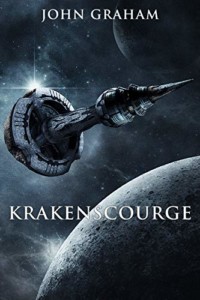Title: Krakenscourge
Author: John Graham
Publisher: Amazon Digital Services, LLC
ISBN: 978-1-7290-7698-9
Pages: 345
Genre: Fiction
Reviewed By: Dan MacIntosh
Pacific Book Review
 Krakenscourge is a fictitious continuation of the Gabriel character in the Voidstalker series. Gabriel is an enhanced human being, and one constantly called upon – it seems – to clean up other people’s messes.
Krakenscourge is a fictitious continuation of the Gabriel character in the Voidstalker series. Gabriel is an enhanced human being, and one constantly called upon – it seems – to clean up other people’s messes.
In this second book from John Graham’s science fiction series, Gabriel is assigned the unappealing task of investigating an attack on an alien vessel. Survivors don’t remember much. However, they do identify their enemies with the term voidstalker. This factor hits close to home because Gabriel is, himself, a voidstalker. This atrocity is, then, not just a horrific as an unnecessary massacre; it’s also a character assassination – of sorts – to Gabriel’s kind.
Some of the good things Graham initiated with Voidstalker, the first book in this series, he continues to develop with Krakenscourge. Most significantly, Graham focuses much attention on Gabriel’s familial relationships. His wife Aster is just as brave and heroic as he is. We also learn in this volume of his five children’s special powers. So, how do you concentrate on saving the world, while all the while keeping your large family unified? This is not a question often asked in superhero stories. Sure, superheroes oftentimes have love interests, but rarely do our heroic figures have families – let alone large ones like Gabriel. This makes Gabriel a relatively unique character.
The best fiction delves into the motivations and innerworkings of human nature. Yes, praiseworthy fiction works require good stories to keep us hooked and continually reading. However, once we buy in to the plot, the best works also draw us deeper into ‘whys’ of these stories. Science fiction writers have for many years criticized human behavior. Furthermore, these same writers create a world (or worlds) where the creatures are oftentimes more civilized than humans. When we look back at horrors like the Holocaust, it’s only natural to imagine how there must be a better society out there somewhere. Certainly, there are civilizations out there that do not kill their own kind in gas chambers, right?
However, the story Graham relays is one where we learn that humans aren’t the only ones hellbent on a bloodthirsty quest for power. It’s been said that absolute power corrupts absolutely, and these evil alien forces Gabriel must hunt down are just as corrupt as the worst in humankind. Therefore, what would happen if we discovered space, that final frontier, is a whole lot like the depressingly corrupt place we inhabit on our own planet? This seems to be one of the unspoken questions Graham asks with Krakenscourge. And it’s a tragic prospect.
On the upside, though, there are characters like Gabriel. He sees all the negativity and bad behavior yet chooses to do the right thing. It’s easy to stare into the heart of darkness and just give up hope. Stop trying to defeat evil forces and let the chips fall where they may. One wonders if this is why creative types invent heroes for books and film. Deep down in our heart of hearts, we want to believe there are good guys/girls out there that are truly good. We look at our own thoughts and behaviors, and we’re many times ashamed at what we see. We find it difficult to believe we could ever be bona fide heroes, so we invent them and invest belief in their imaginary powers. These are acts of faith, of sorts. Although we may not believe in heroes saving the day, like the varieties we see in books and film, we at least want to believe these pillars of morality are possible, if not already existent.
Sure, you can look at Krakenscourge as a good story. And it is, indeed, that. But at its root, though, it is imagination for the purpose – hopefully – of imagining something, somewhere better than where we’re at now. Such high thoughts are what make books like Graham’s newest work essential for keeping human hope alive and well.


